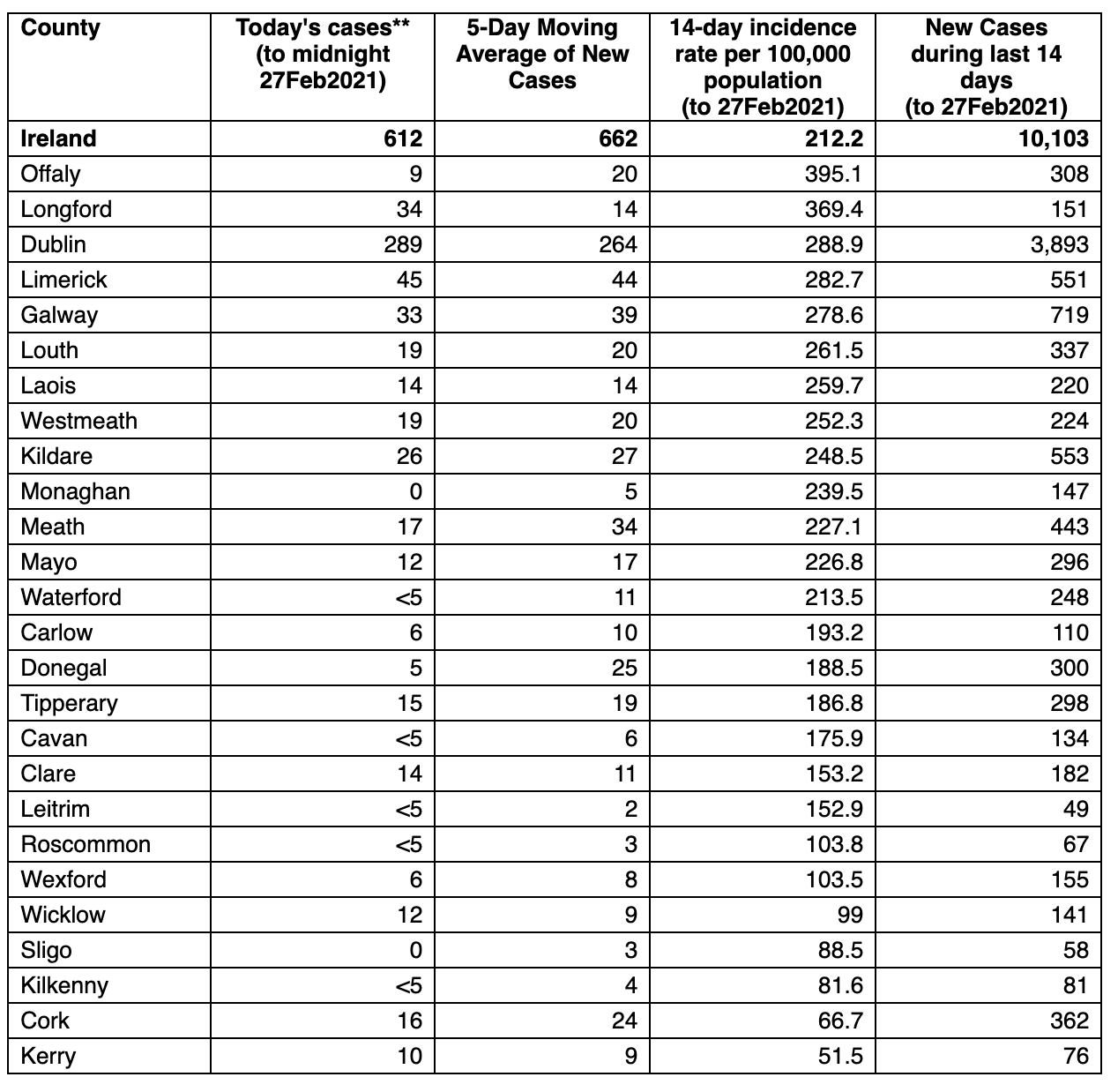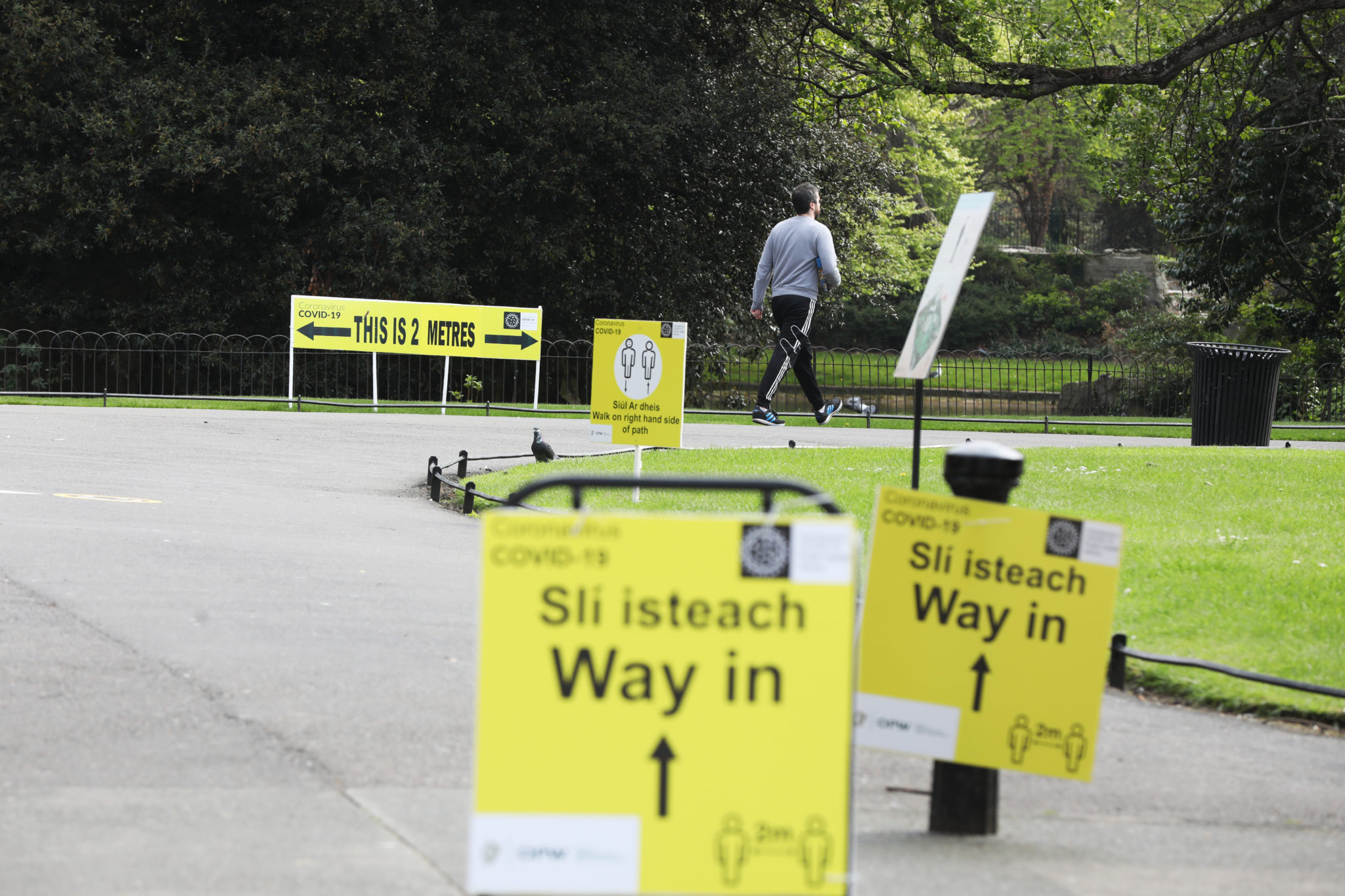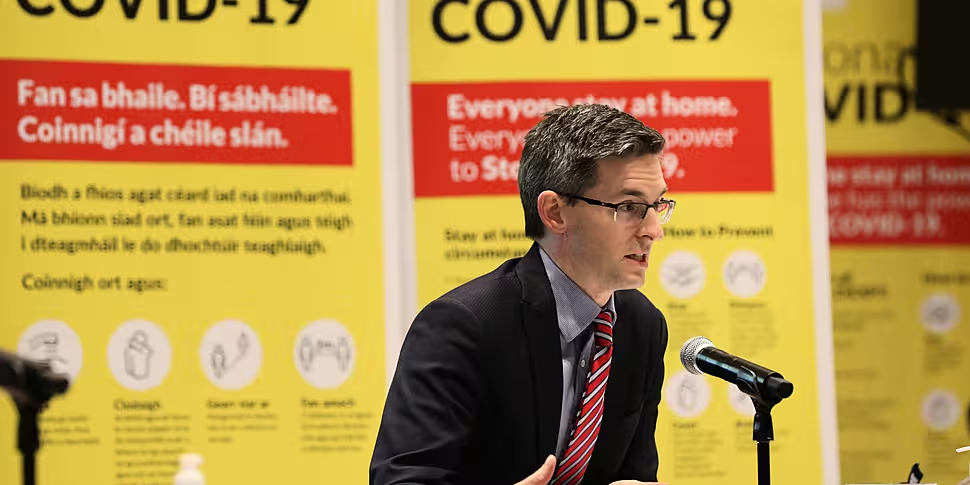There have been 612 new cases of COVID-19 confirmed in Ireland, according to the Department of Health.
Six further deaths associated with the virus have also been reported in the past 24 hours.
The latest figures bring the total amount of cases here to 219,592, while the number of coronavirus-related deaths stands at 4,319.
The median age of those who died was 63 years and the age range was 41 to 86 years.
Of the latest cases, 72% are under 45 years of age, while the median age is 32 years old.
Regarding the nationwide distribution of cases, 289 are in Dublin, 45 in Limerick, 34 in Longford, 33 in Galway, 26 in Kildare and the remaining 185 cases are spread across 19 other counties.
 Today’s cases, 5-day moving average of new cases, 14-day incidence rate per 100,000 of the population and new cases in the last 14 days (as of midnight 27 February 2021)
Today’s cases, 5-day moving average of new cases, 14-day incidence rate per 100,000 of the population and new cases in the last 14 days (as of midnight 27 February 2021)As of 8am today, 554 people are now receiving treatment in hospital for the virus after 19 new admissions in the past 24 hours.
Of those patients, 133 are in ICU, down from 135 yesterday.
The 14-day incidence rate per 100,000 of the population now stands at 212.2.
Dr Ronan Glynn, Deputy Chief Medical, the Department of Health, our lives "have changed in ways we never thought possible" since the first case of coronavirus was confirmed in Ireland a year ago.
“More than 6,300 people on our island have lost their lives with COVID-19. We remember them, and their families and friends, as well as the many people who remain seriously ill or who are dealing with long-term health issues because of this disease," he said.
“The response of colleagues across all parts of our health system has been remarkable.
"We should be extraordinarily proud, and take great heart, from the dedication and resilience which has been – and continues to be - shown by everyone involved in this response."
Reasons for optimism
Dr Glynn added that "almost all sectors and communities have experienced loss and have been tested in ways unimaginable to us this time last year".
"This pandemic and the public health response to it has had a profound impact on lives and livelihoods. But it has also demonstrated the best of us as a people, working together and buying in as a collective to what has been necessary to protect one another.
“Last Spring, we met the challenge presented to us with collective enthusiasm. Ironically, while that enthusiasm has understandably waned and gone, there are more concrete reasons for hope and optimism now than at any time over the last 12 months."
Dr Glynn then outlined a number of reasons to be positive.
He said:
- We have seen week on week reductions in case numbers over the past six weeks and we are on track to have an incidence which is amongst the lowest in Europe
- The number of people in hospital has fallen by 38% over the past fortnight
- We have an educated and informed public and most people continue to do most of the right things most of the time – overcoming disinformation and playing their part in solidarity with one another
- We have a dedicated and committed health workforce who have consistently stepped up to challenges as they have presented
- We have three highly effective vaccines with more on the way, supply is ramping up and we are on course to have given about 80% of adults at least one dose by the end of June
- Vaccines are already having a very positive impact here with cases falling dramatically among healthcare workers and in our nursing homes
- Evidence is mounting quickly that these vaccines, as well as stopping people getting sick, also help to stop people passing the virus onto others
- While new variants have brought uncertainty, the existing vaccines perform well against them and work is already underway to develop booster versions should they be required;
He added "we still have a way to go" and that "our case numbers are still far too high".
 St Stephen's Green in Dublin city centre. Photo: Leah Farrell/RollingNews.ie
St Stephen's Green in Dublin city centre. Photo: Leah Farrell/RollingNews.ieHe urged the public "to continue to do all we can to suppress this disease over the coming weeks".
"But if we can do this successfully through March, our focus will begin to turn to what we can do, rather than what we cannot," Dr Glynn stated.
“Yes, we need to be cautious and yes, there will be challenges over the coming months. But together, through science and solidarity, we will get through this and this pandemic will end.”
It comes as a senior member of NPHET said today he expects there to be an easing of COVID-19 restrictions from April or May.
Professor Philip Nolan, Chair of the Irish Epidemiological Modelling Advisory Group, said he anticipates that widespread vaccination will be under way in the summer months.
"There will probably be a point at which we have quite widespread vaccinations and many of the restrictions call fall away quite quickly, particularly if vaccination is highly effective, as we hope it might be, in interrupting transmission," he told On The Record with Gavan Reilly.









